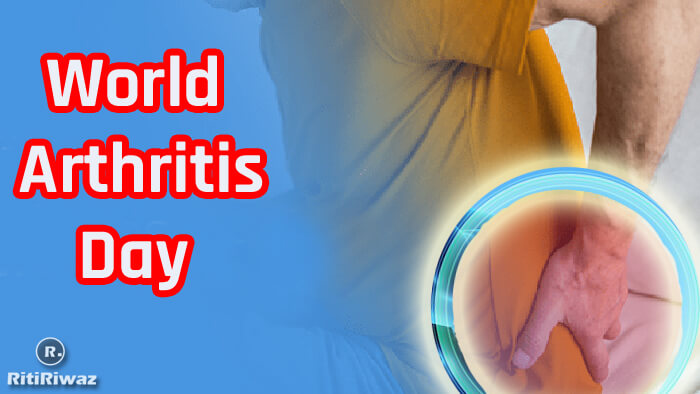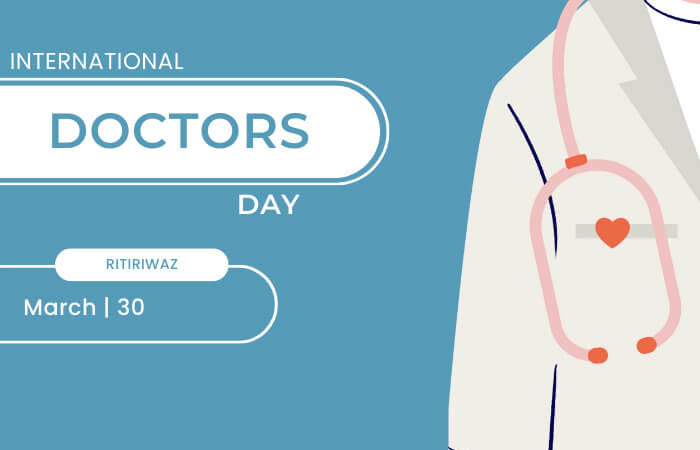World Arthritis Day – 12th October

World Arthritis Day, established in 1996, is observed each year on October 12th. It was established by Arthritis and Rheumatism International (ARI) to raise global awareness of issues affecting people with rheumatic and musculoskeletal diseases (RMDs). To educate people on how early diagnosis and treatment can alleviate pain and improve the quality of life for the affected patients.
It is an event to join together people with rheumatic and musculoskeletal diseases from around the world so that it raises awareness and reduces the impact of arthritis. A day that encourages organizations and individuals around the world to work towards increasing awareness about arthritis and other rheumatic conditions.
World Arthritis Day theme 2023: “Living with an RMD at all stages of life2Work”.
Arthritis refers to a debilitating condition characterized by inflammation of the joints in the body, such as the shoulders, elbows, knees, and hips. With more than 100 different types of arthritis and treatments, it is important that people are aware of what treatment works best for them. Two of the most common types are osteoarthritis (OA) and rheumatoid arthritis (RA) but other types such as gout are also prevalent, with symptoms that usually develop over time, but may also appear suddenly. While arthritis is most commonly seen in adults over the age of 65, increasingly it is also developing in children, teens, and younger adults. Moreover, rheumatoid arthritis is more common in women than men and osteoarthritis in people who are overweight.
The aims of World Arthritis Day are to:
-
Raise awareness of RMDs amongst the medical community, people with RMDs, and the general public.
-
Influence public policy by making decision-makers aware of the burden of arthritis causes and the steps which can be taken to ease it.
-
Ensure all people with arthritis and their caregivers are aware of the vast support network available to them.
Like all diseases, arthritis too comes with its own set of risk factors. Some of which you can control and others you cannot. Here’s a look at factors that increase your chances of getting arthritis.
Risk Factors You Can Control
Modifiable risk factors are something that you can control. Making lifestyle changes can decrease your risk of getting some types of arthritis or can help in not making it worse. These include:
Obesity
People who are obese and overweight are more likely to be diagnosed with arthritis. Being overweight is the main cause of immense stress on the joints especially in the hip and knees joints. The overweight causes an immense impact on the joints and causes inflammation that slowly erodes the joint tissue. By maintaining a healthy weight is the main step in decreasing the chances of getting arthritis.
Infection
Certain bacterial and viral infections around the joint area can lead to the deterioration of the cartilage. People who have recurrent joint infections run a higher risk of developing arthritis. If you notice any redness or swelling in your joints get it checked immediately as it could be an infection.
Joint Injuries
Joint injuries or overuse of the joints can put additional stress and contribute to arthritis. High-intensity sports such as long-distance running can place persistent stress on the joints can also develop arthritis. Don’t do high-intensity exercise while a moderate exercise routine can minimize the symptoms or development of arthritis by strengthening the muscular structure around the joint and giving it support.
Risk Factors You Cannot Control
While there are certain factors that you can control, non-modifiable risk factors are something that cannot be controlled. These include:
Age
Old age is a major factor for arthritis as the cartilage becomes increasingly brittle over time and has a lower capacity of repairing itself.
Gender
Most types of arthritis are more common in women, such as osteoarthritis, rheumatoid arthritis, and fibromyalgia. Gout is more common in men.
Genetics
Your family history and genes can also contribute to the development of certain types of arthritis.
Arthritis affects millions of adults and only a few types can be cured. We should focus on treatment and preserve joint function so that we can decrease the severity of the disease. It’s time to connect and take action, to facilitate better diagnosis and treatment for all people living with a Rheumatic Musculoskeletal Disease or caring for someone with one.
Suggested Read: Important Days In October






